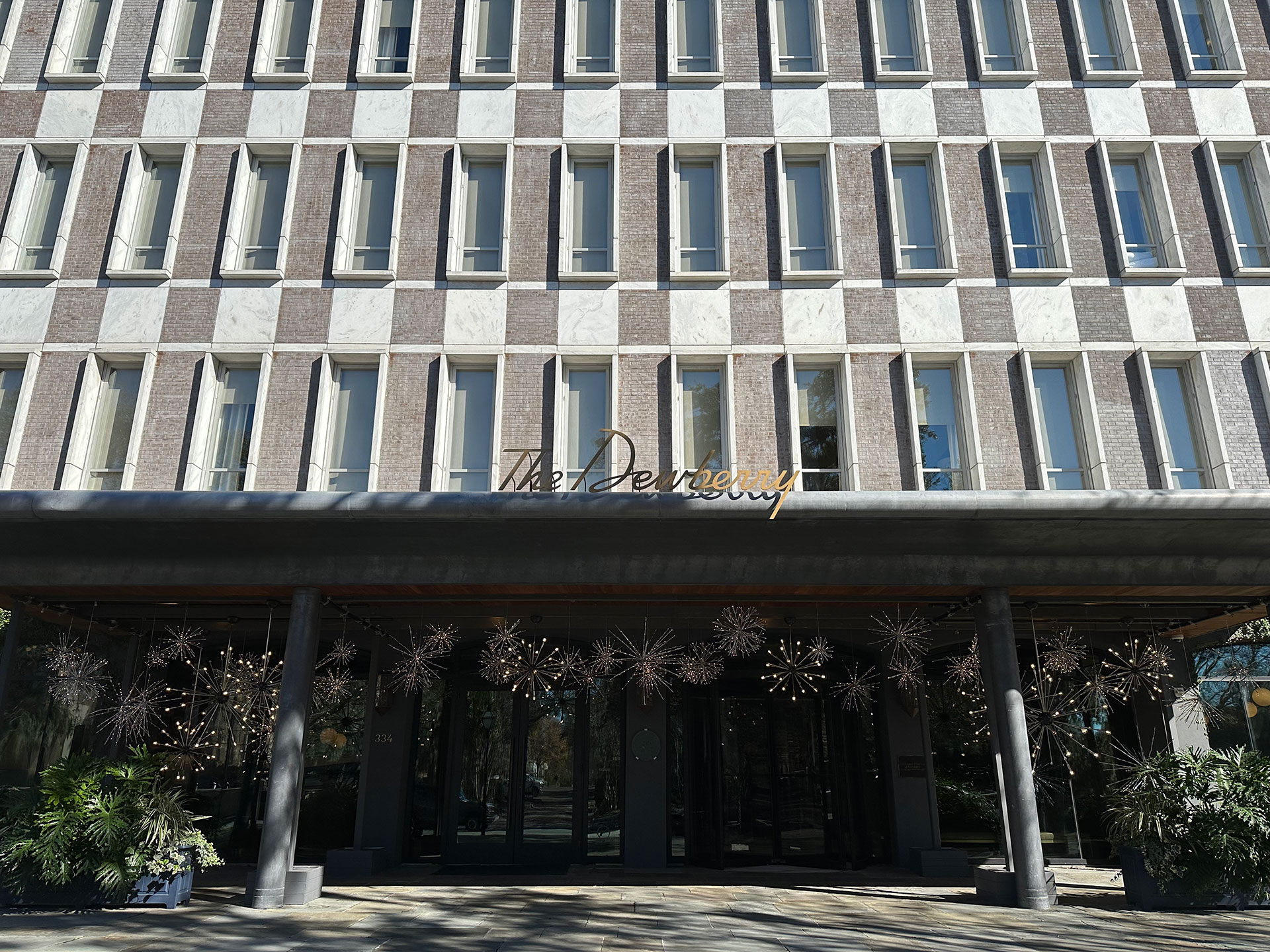
The Dewberry is one of the most well-reviewed hotels by our guests. A recent visit to the South Carolina staple showed exactly why, and it’s not just because of all the credenzas.
When I was told to visit Charleston to write about the Dewberry hotel, I had no idea my most vivid memory of the experience would be meeting Tia Clark.
A few years back, a health crisis led Tia to rethink her lifestyle. A native Charlestonian, she was working in a windowless dive bar when a doctor told her she needed to eat better and get active. By happenstance, she found both solutions in her Gullah Geechee heritage, when a cousin invited her to try crabbing. The Gullah are descendants of enslaved West Africans who lived and labored in the marshy, coastal Lowcountry of South Carolina. The isolation of their surroundings led to one of the most unique cultural traditions in the country. Naturally, seafood is a staple of the cuisine — fish, shrimp, and particularly crab.
I was skeptical when the Dewberry staff recommended Casual Crabbing with Tia. I’d told them I was interested in trying some local activities and wanted to get out on the water, but I had something more like a typical boat tour in mind. Instead, I was sent to a dock to meet Tia, a fountain of charisma who led me enthusiastically to her crab traps.
Within minutes of meeting, we were pulling crab lines and coddling lively crustaceans. Tia would demonstrate how to avoid getting pinched, and chide me charmingly when I failed the proper technique. During a break, she explained how she rediscovered this part of her heritage — she learned to use traditional nets before modern crab traps — and how it changed her life, giving her a newfound connection to her place and culture. It soon became a hobby. And that exploded into a career.
As we reeled in another trap, Tia asked me what I did for work. I told her I was lucky, here to write about the city. Typical to everything I had learned about Tia, she lit up to meet someone else doing something they loved.
Specifically, I was here to write about the Dewberry, a hotel that creates a midcentury dreamscape out of imported vintage furniture and the sweeping architecture of a former federal building commissioned in 1964 by Lyndon Johnson. It’s possible the founders of the Dewberry have severely driven up the price of antique credenzas across the world — they’re everywhere here, paired with large, patina-aged mirrors that send you further back in time.








The Dewberry has the visual identity of a tiny boutique hotel, in the bones of a 154-room behemoth. But that’s not what makes it one of the best hotels in the city, and one of the best-reviewed by our guests. That would be Tia.
Or, what I mean is, it’s the Dewberry’s ability to find Tia, and to convince you to try her experience. From the start of my trip to the very end, I leaned nonstop on the Dewberry staff for recommendations and guidance. I felt it a necessity. As small and quaint as this city might be, it is an overwhelming collection of experiences: history, art, nightlife, fine dining, fishing, islands, and on and on and on, set within a warm, walkable city that begs you to explore. Case in point, it’s the very rare city that specializes in both barbecue and seafood.
About that history. To me, an unabashed Yankee, Charleston was like Boston. A well-preserved, colonial-feeling city, with plenty of cobblestone along the harbor in the beautiful historic quarter — but the landmarks you pass here have little to do with the American Revolution and all to do with America’s original sin. The Old Slave Mart Museum was chilling, but tiny. As I understand it, Charleston’s spent the last decade or so grappling with how to present its deeply troubling history. The International African American Museum, set on the wharf where approximately 40% of all slaves entered the country, is brand new and stunning.
So come with a few things in mind and let the staff at the Dewberry narrow your itinerary. Put down to Southern hospitality the fact that you’ll instinctively trust them. It took three occurrences before I realized that everyone — from concierge to server to driver — was addressing me by name before any introduction. I asked, and no, it wasn’t just for me. They attempt this trick of hospitality for every guest, and it goes a long way to building trust.
The Dewberry has a well-vetted list of recommendations for spots all around the city, but make sure to head straight up to the Citrus Club, their own rooftop cocktail bar (the highest in Charleston), and to their lobby Living Room for a strong old fashioned and a plate of oysters on the half shell. (Note: their other restaurant, Henrietta’s, is closed at the moment — to be replaced soon.)




What room to stay in? King rooms make their homes in the former offices of what was once an administrative building, and are cozy, well-appointed, and in possession of wonderful Irish linens. They’re also reasonably sized in a way my large suite was certainly not. If you’re here to splurge, try a stay in a Charleston Flat, a 511-square foot space, complete with a cast-iron tub for the glorious bathroom and wingback chairs for the little living area. One evening, I exited the bath to find a plate of freshly baked cookies in the living space.
No matter where you lodge, you’ll have access to all the Dewberry’s public spaces, spa, on-site rental car system, airport transfers, and drivers willing to shuttle you wherever you need.
Traveling by myself, it was more connection than I’m used to; but staff aren’t overly relentless with their recommendations, and they won’t corner you for a conversation. Ask for a barbecue spot and they’ll write a few names on a notecard and ask if you’d like a driver. Say no and there’s no pushy insistence that you take their advice. But if you ask me, take them up on everything. After all, that’s how I found Tia. •
Book the Dewberry on Tablet Hotels

Mitchell Friedman is an editor and social media manager for Tablet and Michelin Guide hotels. He’s been with Tablet since 2018, and wants you to subscribe to our newsletter.

